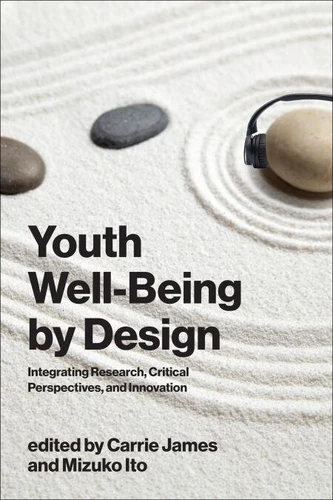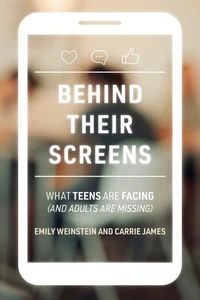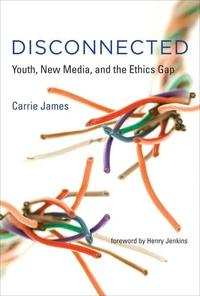Youth Well - Being by Design. Integrating Research, Critical Perspectives, and Innovation
Par : ,Formats :
Actuellement indisponible
Cet article est actuellement indisponible, il ne peut pas être commandé sur notre site pour le moment. Nous vous invitons à vous inscrire à l'alerte disponibilité, vous recevrez un e-mail dès que cet ouvrage sera à nouveau disponible.
Disponible dans votre compte client Decitre ou Furet du Nord dès validation de votre commande. Le format ePub protégé est :
- Compatible avec une lecture sur My Vivlio (smartphone, tablette, ordinateur)
- Compatible avec une lecture sur liseuses Vivlio
- Pour les liseuses autres que Vivlio, vous devez utiliser le logiciel Adobe Digital Edition. Non compatible avec la lecture sur les liseuses Kindle, Remarkable et Sony
- Non compatible avec un achat hors France métropolitaine
 , qui est-ce ?
, qui est-ce ?Notre partenaire de plateforme de lecture numérique où vous retrouverez l'ensemble de vos ebooks gratuitement
Pour en savoir plus sur nos ebooks, consultez notre aide en ligne ici
- Nombre de pages348
- FormatePub
- ISBN978-0-262-05255-9
- EAN9780262052559
- Date de parution14/04/2026
- Protection num.Adobe DRM
- Infos supplémentairesepub
- ÉditeurThe MIT Press
Résumé
An edited collection with fresh approaches to tech and youth well-being that go beyond blame and simplistic solutions. The relationship between technology use and youth wellbeing has been a topic of concern-and contention-for some time. The adolescent mental health crisis has amplified the debate to a fever pitch. But the relationship between technology use and well-being can't be reduced to the question of whether social media and other technologies are good or bad.
Finding effective solutions needs to be grounded in the broader and diverse realities of young people's lives. Youth Well-Being by Design, edited by Carrie James and Mizuko Ito, shifts the conversation in productive directions, to move beyond the unproductive finger-pointing at tech, technologically determinist narratives, and fixation on sweeping, one-size-fits-all solutions that often do more harm than good.
The collection offers essential research insights, critical perspectives, and design frameworks supportive of youth well-being in a technology-rich world. Essays offer insights from developmental science and youth development, sociocultural perspectives, well-being research, dignity theory, sociology, psychology, and community organizing. Contributors make the case for youth-centered and community-based approaches, methods, and measures for research and design including participatory design, critical race theory, and critical humanizing digital literacies.
Qualitative data (including case studies) provide robust descriptions of youth perspectives and experiences, as well as promising pedagogies and methods for taking youth- and agency-centered approaches to designing for youth well-being.
Finding effective solutions needs to be grounded in the broader and diverse realities of young people's lives. Youth Well-Being by Design, edited by Carrie James and Mizuko Ito, shifts the conversation in productive directions, to move beyond the unproductive finger-pointing at tech, technologically determinist narratives, and fixation on sweeping, one-size-fits-all solutions that often do more harm than good.
The collection offers essential research insights, critical perspectives, and design frameworks supportive of youth well-being in a technology-rich world. Essays offer insights from developmental science and youth development, sociocultural perspectives, well-being research, dignity theory, sociology, psychology, and community organizing. Contributors make the case for youth-centered and community-based approaches, methods, and measures for research and design including participatory design, critical race theory, and critical humanizing digital literacies.
Qualitative data (including case studies) provide robust descriptions of youth perspectives and experiences, as well as promising pedagogies and methods for taking youth- and agency-centered approaches to designing for youth well-being.
An edited collection with fresh approaches to tech and youth well-being that go beyond blame and simplistic solutions. The relationship between technology use and youth wellbeing has been a topic of concern-and contention-for some time. The adolescent mental health crisis has amplified the debate to a fever pitch. But the relationship between technology use and well-being can't be reduced to the question of whether social media and other technologies are good or bad.
Finding effective solutions needs to be grounded in the broader and diverse realities of young people's lives. Youth Well-Being by Design, edited by Carrie James and Mizuko Ito, shifts the conversation in productive directions, to move beyond the unproductive finger-pointing at tech, technologically determinist narratives, and fixation on sweeping, one-size-fits-all solutions that often do more harm than good.
The collection offers essential research insights, critical perspectives, and design frameworks supportive of youth well-being in a technology-rich world. Essays offer insights from developmental science and youth development, sociocultural perspectives, well-being research, dignity theory, sociology, psychology, and community organizing. Contributors make the case for youth-centered and community-based approaches, methods, and measures for research and design including participatory design, critical race theory, and critical humanizing digital literacies.
Qualitative data (including case studies) provide robust descriptions of youth perspectives and experiences, as well as promising pedagogies and methods for taking youth- and agency-centered approaches to designing for youth well-being.
Finding effective solutions needs to be grounded in the broader and diverse realities of young people's lives. Youth Well-Being by Design, edited by Carrie James and Mizuko Ito, shifts the conversation in productive directions, to move beyond the unproductive finger-pointing at tech, technologically determinist narratives, and fixation on sweeping, one-size-fits-all solutions that often do more harm than good.
The collection offers essential research insights, critical perspectives, and design frameworks supportive of youth well-being in a technology-rich world. Essays offer insights from developmental science and youth development, sociocultural perspectives, well-being research, dignity theory, sociology, psychology, and community organizing. Contributors make the case for youth-centered and community-based approaches, methods, and measures for research and design including participatory design, critical race theory, and critical humanizing digital literacies.
Qualitative data (including case studies) provide robust descriptions of youth perspectives and experiences, as well as promising pedagogies and methods for taking youth- and agency-centered approaches to designing for youth well-being.





